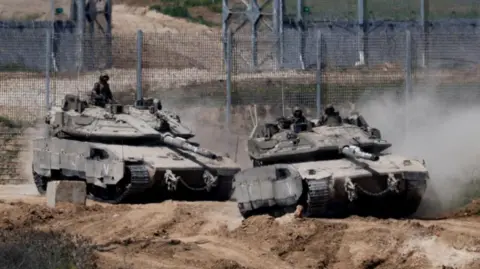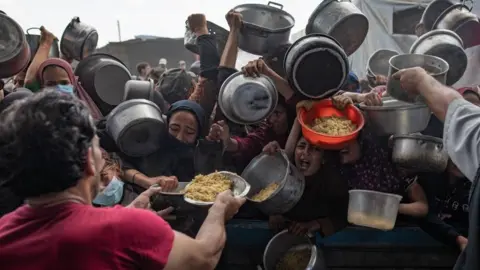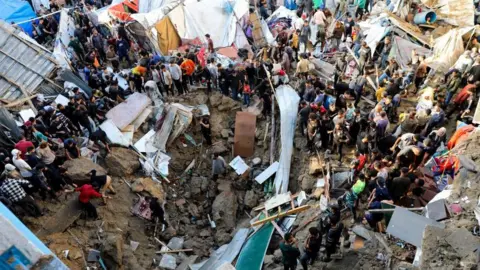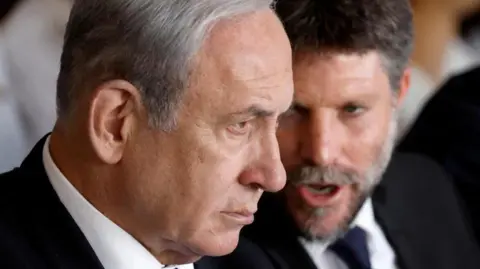Jeremy Bowen: Netanyahu’s plan for Gaza risks dividing Israel, killing Palestinians and horrifying world
21 minutes agoJeremy BowenInternational Editor, BBC News

 Reuters
ReutersIsrael’s Prime Minister Benjamin Netanyahu has told Israelis that “we are on the eve of an intense entry into Gaza.” Israel would, he said, capture territory and hold it: “They will not enter and come out.”
The new offensive is calculated, according to the spokesperson for the Israel Defense Forces (IDF) Brigadier-General Effie Defrin, to bring back the remaining hostages. After that, he told Israeli radio, “comes the collapse of the Hamas regime, its defeat, its submission”.
The offensive will not start, Israel says, until after Donald Trump’s trip to Saudi Arabia, the United Arab Emirates and Qatar next week. Assuming Trump does not dissuade Israel from going ahead, Israel will need a military and political miracle to pull off the results described by Brig-Gen Defrin.
It is more likely that the offensive will sharpen everything that makes the Gaza war so controversial. The war, starting with the Hamas attacks of 7 October 2023, has taken the conflict between Palestinians and Israelis to a point as dangerous as any in its long history. Prolonging the war divides Israelis, kills even more Palestinian civilians and horrifies millions around the world, including many who describe themselves as friends of Israel.
While the IDF attacks Hamas in Gaza, the government’s plan is that its soldiers will force some or all of the more than two million Palestinian civilians in Gaza into a small area in the ruins of the south. Humanitarian aid would be distributed, perhaps by contractors including American private security firms. The United Nations humanitarian agencies have said they will not cooperate, condemning the plan as a violation of the principles of humanitarian aid.
They have also warned of starvation in Gaza caused by Israel’s decision more than two months ago to block all humanitarian deliveries. Israel’s blockade, which continues, has been widely condemned, not just by the UN and Arab countries.

 EPA
EPANow, Britain and the European Union both say they are against a new Israeli offensive. A fortnight ago, the foreign ministers of the United Kingdom, France and Germany, all allies of Israel who regard Hamas as a terrorist group, warned that the “intolerable” blockade put Palestinian civilians, including one million children, at “an acute risk of starvation, epidemic disease and death”.
The ministers also warned, implicitly, that their ally was violating international law.
“Humanitarian aid must never be used as a political tool and Palestinian territory must not be reduced nor subjected to any demographic change”, they insisted. “Israel is bound under international law to allow the unhindered passage of humanitarian aid.”
Israel denies it violates international humanitarian law and the laws of war in Gaza. But at the same time its own ministers’ words suggest otherwise. One of many examples: the defence minister Israel Katz has described the blockade as a “main pressure lever” against Hamas. That sounds like an admission that the blockade is a weapon, even though it starves civilians, which amounts to a war crime.
Countries and organisations that believe Israel systematically violates its legal obligations, committing a series of war crimes, will scour any new offensive for more evidence. Extreme language used by ministers will have been noted by the South African lawyers arguing the case at the International Court of Justice alleging Israeli genocide in Gaza.
Much of it has come from ultra-nationalists who prop up the Netanyahu government. They see the new offensive as another step towards expelling Palestinians from Gaza and replacing them with Jewish settlers.
One of the most vocal extremists, Bezalel Smotrich, the finance minister said that in six months Gaza would be “totally destroyed”. Palestinians in the territory would be “despairing, understanding that there is no hope and nothing to look for in Gaza, and will be looking for relocation to begin a new life in other places”.
“Relocation”, the word used by Smotrich, will be seen both by his supporters and political enemies as another reference to “transfer”, an idea discussed since the earliest days of Zionism to force Arabs out of the land between the River Jordan and the Mediterranean Sea.

 Reuters
ReutersNetanyahu’s Israeli critics say prolonging the war with a new offensive instead of ending it with a ceasefire is about his own political survival, not Israel’s safety or the return of its hostages. In the days after the 7 October attacks there were lines of cars hurriedly parked outside military bases as Israelis rushed to volunteer for reserve duty to fight Hamas.
Now thousands of them (some estimates from the Israeli left are higher) are refusing to do any more reserve duty. They argue the prime minister is continuing the war because if he doesn’t his hard right will bring down the government and bring on the day of reckoning for mistakes and miscalculations Netanyahu made that gave Hamas an opportunity to attack.
Inside Israel, the sharpest criticism of the planned offensive has come from the families of the hostages who fear they have been abandoned by the government that claims to be rescuing them. Hamas still has 24 living hostages in the Gaza Strip, according to Israel, and is holding the bodies of another 35 of the 251 taken on 7 October. The Netanyahu government has claimed repeatedly that only as much military pressure as possible will get the survivors home and return the bodies of the dead to their families.
In reality, the biggest releases of hostages have come during ceasefires. The last ceasefire deal, which Trump insisted Israel sign in the final days of the Biden administration, included a planned second phase which was supposed to lead to the release of all the hostages and a full Israeli withdrawal from Gaza.

 Reuters
ReutersNetanyahu’s extremist allies told him they would bring down his government if he agreed to a second phase of the ceasefire. First, Israel blocked humanitarian aid to put pressure, it said, on Hamas to agree to a renegotiated deal that would give Israel the option of going back to war even after the hostages were released. When Hamas refused, Israel went on the offensive again with a massive air attack on the night of 18 March.
Since then, Israel has put unrelenting pressure on Palestinians in Gaza. A new offensive will kill many more Palestinian civilians, deepen the misery of the survivors and bereaved inside Gaza and widen the toxic rifts within Israel. On its own, without a ceasefire deal, it is unlikely on past form to force Hamas to free the remaining hostages without a ceasefire deal.
The carnage inflicted by Israel inside Gaza has been a recruiting sergeant for Hamas and other armed groups, according to President Joe Biden’s administration just before it left office in January of this year. It is worth repeating the words used by Biden’s secretary of state, Antony Blinken, in a speech in Washington on 14 January.
“We assess that Hamas has recruited almost as many new militants as it has lost,” Blinken said. “That is a recipe for an enduring insurgency and perpetual war.”
When he spoke, Israel was claiming that it had killed around 18,000 Palestinian fighters inside Gaza. More have been killed since then, and many more civilians.
Israel’s massive onslaught broke the back of Hamas as a structured military organisation more than a year ago. Now Israel faces an insurgency, which history shows can go for as long as recruits are prepared to fight and die to beat their enemy.